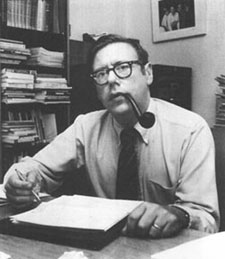Top Qs
Timeline
Chat
Perspective
Arthur Melvin Okun
American economist (1928–1980) From Wikipedia, the free encyclopedia
Remove ads
Arthur Melvin "Art" Okun (November 28, 1928 – March 23, 1980) was an American economist.
Okun is known in particular for Okun's law, an observed relationship that states that for every 1% increase in the unemployment rate, a country's GDP will be roughly an additional 2.5% lower than its potential GDP. He is also known as the creator of the misery index and the analogy of the deadweight loss of taxation with a leaky bucket.[1]
Remove ads
Biography
Okun graduated from Columbia College in 1949 with the Albert Asher Green Memorial Prize for the highest GPA.[2] He went on to obtain a Ph.D. in economics from Columbia in 1956 before teaching at Yale University.[3]
He served as the chairman of the Council of Economic Advisers between 1968 and 1969. Afterwards, he became a fellow at the Brookings Institution in Washington, D.C. In 1968 he was elected as a Fellow of the American Statistical Association.[4]
He died on March 23, 1980, of a heart attack.[5]
Remove ads
Works
- Equality and Efficiency: The Big Tradeoff (Washington, D.C.: Brookings Institution, 1975)
- Prices and Quantities: A Macroeconomic Analysis, see here (1981) ISBN 0-8157-6480-4
References
External links
Wikiwand - on
Seamless Wikipedia browsing. On steroids.
Remove ads

